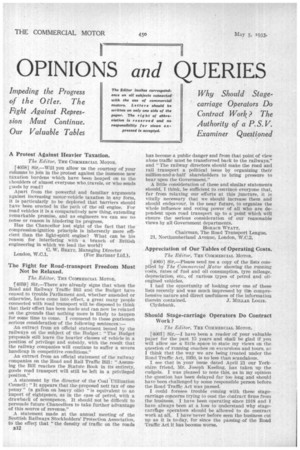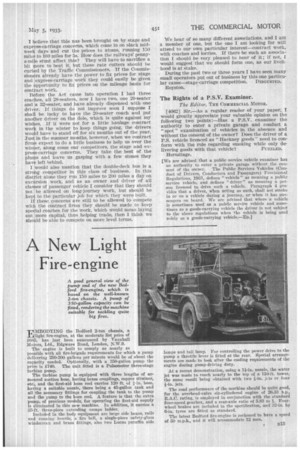OPINIONS and QUERIES
Page 142

Page 143

If you've noticed an error in this article please click here to report it so we can fix it.
Impeding the Progress of the Oiler. The Fight Against Repression Must Continue. Our Valuable Tables
A Protest Against Heavier Taxation.
The Editor, THE COMMERCIAL MOTOR.
{4058] Sir,—Will you allow us the courtesy of your columns to join in the protest against the immense new taxation burdens which have been heaped on to the Etoulders of almost everyone who, travels, or who sends Loads by road?
Apart from the powerful and familiar arguments against increasing motor-vehicle taxation in any form, it is particularly to be deplored that barriers should have been erected in the path of the oil engine. For road vehicles it is a comparatively new thing, extending remarkable promise, and as engineers we can see no sense or reason in hindering its progress.
Has the Chancellor lost sight of the fact that the compression-ignition principle is inherently more efficient than the light-spirit engine? What can be his reason for interfering with a branch of British engineering in which we lead the world?
• C. W. BRETT, Managing Director
London, W.C.1. (For Barimar Ltd.).
The Fight for Road-transport Freedom Must Not be Relaxed.
The Editor, THE COMMERCIAL MOTOR.
t4059] Sir,—There are already signs that when the Road and Railway Traffic Bill and the Budget have ceased to trouble Parliament and, whether amended or otherwise, have come into effect, a great many 'people connected with road transport will be disposed to think that their effort has been made and can now be relaxed on the grounds that nothing more is likely to happen for some time to come. I commend to these gentlemen serious consideration' of the following sentences :— An extract from an official statement issued by the railways on the subject of the Budget : "The Budget proposals still leave the heavier classes of vehicle in a position of privilege and subsidy, with the result that the railway companies will continue to suffer a severe handicap in competitive conditions."
An extract from an official statement of the railway companies on the Road and Rail Traffic Bill: "Assuming the Bill reaches the Statute Book in its entirety, goods road transport will still be left in a privileged position."
A statement by the director of the Coal Utilization Council : "It appears that the -proposed nett tax of one penny" (a gallon on heavy oils) "is equivalent to an import of eightpence, as in the case of petrol, with a drawback of sevenpence. It should not be difficult to persuade future Chancellors to take further advantage of this source of revenue."
A statement made at the annual meeting of the Scottish Railways Stockholders' Protection Association, to the effect that "the density of traffic on the roads B12
has become a public danger and from that point of view alone traffic must be transferred back to the railways," and "The railway directors should make the road and rail transport a political issue by organizing their million-and-a-half shareholders to bring pressure to bear upon the Government."
A little consideration of these and similar statements should, I think, be sufficient to convince everyone that, far from relaxing our efforts at this juncture, it is vitally necessary that we should increase them and should endeavour, in the near future, to organize the *hole influence and voting power of all who are dependent upon road transport up to a point which will ensure the serious consideration of our reasonable views by all Government departments.
HORACE WYATT,
Chairman, The Road Transport League. 21, Northumberland Avenue, London, W.C.2.
Appreciation of Our Tables of Operating Costs.
The Editor, THE COMMERCIAL MOTOR.
[4060] Sir,—Please send me a copy of the lists compiled by The Commercial Motor showing the running costs, rates of fuel and oil consumption, tyre mileage, depreciation, etc., of various types of petrol and oilengined vehicles.
I had the opportunity of looking over one of these lists recently and was much impressed by th'e comprehensive nature and direct usefulness of the information therein contained. • Jr. MILLAR rioGIE. Clydebank.
Should Stage-carriage Operators Do Contract Work ?
The Editor, THE COMMERCIAL MOTOR.
140611 Sir,—I have been a reader of your valuable paper for the past 15 years and shall be glad if you will allow me a little space to state my views on the question of running coaches on excursions and tours, as I think that the way we are being treated under the Road Traffic Act, 1930, is no less than scandalous.
I see that in your issue dated April 21 our Yorkshire friend, Mr. Joseph Keeling, has taken up the cudgels. I was pleased to note this, as in my opinion the question has been delayed far too long and should have been challenged by some responsible person before the Road Traffic Act was passed.
I could foresee trouble coming with these stagecarriage concerns trying to oust the contract firms from the business. I have been operating since 1918 and I have always been at a loss to understand why stagecarrfage operators should be allowed to do contract work at all. I have never before seen the business cut up as it is to-day, for since the passing of the Road Traffic Act it has become worse. I believe that this nas been brought on by stage and express-carriage concerns, which come in on slack midweek days and cut the prices to atoms, running 150 miles to 160 miles for 5s. How does the railways' pennya-mile stunt affect this? They will have to sacrifice a bit more to beat it, but these rate Cutters should be curbed by the Traffic Commissioners. If the Commissioners already have the power to fix prices for stage and express-carriage work they could easily be given the opportunity to fix prices on the mileage basis for contract work.
Before the Act came into operation I had three coaches, all 28-seaters, now I have two, one 20-seater and a 32-seater, and have already dispensed with one driver. If things do not improve soon I suppose I shall be lucky to have the 20-seater coach and put another driver on the dole, which is quite against my wishes. If it were not for a little haulage contract work in the winter to keep things going, the drivers would have to stand off for six mouths out of the year. Just in the summer months, however, when we contract firms expect to do a little business to help us over the winter, along come our competitors, the stage and express-carriage concerns. They take the best of the plums and leave us gasping with a few stones they have left behind.
I would also mention that the double-deck bus is a strong competitor in this class of business. In this district alone they run 150 miles to 200 miles a day on excursion work, and as an owner and driver of all classes of passenger vehicle I consider that they should not . be allowed on long-journey work, but should he kept to the particular job for which they were built.
If these, concerns are still to be allowed to compete with the contract firms they should be made to keep special coaches for the work, -which would mean laying out more capital, thus helping trade, then I think we should be able to compete on snore level terms.
We hear of so many different associations, and I am a member of one, but the one I am looking for will attend to oar own particular interest—contract work, with coaches and lorries. If there be such an association I should be Very pleased to hear of it; if not, would suggest that we should form one, as our livelihood is at stake.
During the past two or three years I have seen many small operators put out of business by this one particular cause—stage-carriage competition. DISGUSTED.
Royston.
The Rights of a P.S.V. Examiner.
The Editor, THE COMMERCIAL MOTOR.
[4062] Sir,—As a regular reader of your paper, I would greatly appreciate your valuable 'opinion on the following two points :—Has a P.S.V, examiner the authority to enter a private garage and conduct a " spot " examination of vehicles in the absence and without the consent of the owner? Does the driver of a P.S. vehicle licenced as "Hackney goods" need to conform with the rule regarding smoking while only de livering goods with that vehicle? PUZZLED. Hermitage.
[We are advised that a public service vehicle examiner has no authority to enter a private garage without the consent of the owner. The Public Services Vehicles (Conduct of Drivers, Conductors and Passengers) Provisional Regulations, 1931, defines " vehicle " as meaning a public service vehicle, and defines "driver" as meaning a person licensed to drive such a vehicle. Paragraph 4 pro. vides that a driver, when acting as such, shall not smoke in or on a vehicle during a journey, or when it has passengers on board. We are advised that where a vehicle is sometimes used as a public service vehicle and sometimes as a goods-carrying vehicle the driver is not subject to the above regulations when the vehicle is being used solely as a goods-carrying vehicle.—En.]




























































































































































































